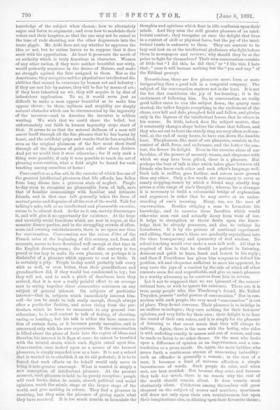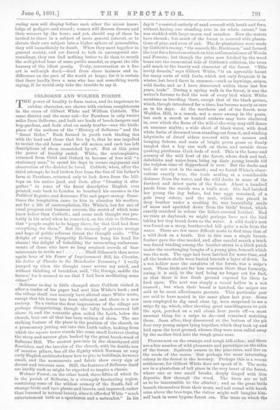THE ART OF CONVERSATION.
IN a paper contributed to the Nineteenth Century of this month, Mr. Hamilton Aide, who records his impressions of American society, offers a tribute of warm admiration to the conversational powers of the ladies of Boston. Never, he says, has he encountered such an easy flow of humour, or such a prodigal display of wit and intelligence, as that which enlightens and enlivens the hospitality of that home of culture. And, while dealing with this subject of social commerce generally, he takes the opportunity to quote an advertisement from an American newspaper which attracted his attention, and seemed to him to be worthy of more general notice. The advertisement is merely a statement to the effect that there are several ladies in New York who earn their livelihood by holding conversation classes and giving instruction in what is one of the most difficult and most important of all the social arts. Their pupils are taught what subjects to choose, and what to avoid ; how best to display their
knowledge of the subject when chosen; how to alternately argue and listen to argument ; and even how to modulate their voices and their laughter, so that the one may not be raised to the tone of rude shouting, nor the other degenerate into the inane giggle. Mr. Aide does not say whether he approves the idea or not, but he rather leaves us to suppose that it does meet with his approbation. At least it possesses the merit of an audacity which is truly American in character. Women of any other nation, if they were neither beautiful nor witty, would patiently acquiesce in the decree of Nature, and make no struggle against the fate assigned to them. Not so the Americans; they recognise neither physical nor intellectual die. abilities that cannot be overcome by human art and industry ; if they are not fair by nature, they will be fair by means of art ; if they have inherited no wit, they will acquire it by dint of industrious application. To us, it would seem just as difficult to make a man appear beautiful as to make him appear clever : to them, ugliness and stupidity are simply natural obstacles which can be circumvented by the ingenuity of the inventor—and in America the inventor is seldom wanting. We wish that we could share the belief, but unfortunately our faith in human ingenuity stops short of that. It seems to us that the natural dullness Of a man will assert itself through all the fine phrases that he has learnt by heart, and the artificial quips and cranks that he has acquired, even as the original plainness of the face must show itself through all the disguises of paint and other sham devices. And yet we would that it were otherwise ; for if only such a thing were possible, if only it were possible to teach the art of pleasing conversation, what a field might be found for such teaching among ourselves at home I
Conversation as a fine art, in the exercise of which lies one of the greatest intellectual pleasures that life affords, has fallen from long disuse into a grievous state of neglect. People to. day seem to recognise no pleasurable form of talk, Gaye that of familiar communings with familiar, and intimate friends, and in that case talk generally takes the form of mutual praise and dispraise of all the rest of the world. Talk for talking's sake, talk as an intellectual and pleasurable exercise, seems to be almost dead. As far as it can, society discourages it, and will give it no opportunity for existence. At the huge and unwieldy social functions which are now in vogue, at the monster dinner-parties, and in the struggling crowds of after- noon and evening entertainments, there is no space nor time for conversation. Conversation was the raison dare of the French salon at the beginning of this century, and, from all accounts, seems to have flourished well enough at that time in the English drawing-room ; the end of this century is too proud or too lazy to make its own pleasure, or perhaps it is disdainful of a pleasure which appears to cost so little. It is certainly a pity. People to-day could probably talk every whit as well, or even better, than their grandfathers and grandmothers did, if they would but condescend to try ; but they will not, and to such a pitch of dumbness have they arrived, that it is now a really painful effort to an average man to string together three consecutive sentences on any subject of general interest. On subjects of partidular interest—that is, subjects which immediately interest him- self—he can be made to talk easily enough, though always after a particular fashion, and never rising from the par- ticulars which he loves to enumerate to any general con- sideration; he is well content to talk oE fishing, of shooting, racing or hunting; but his talk is either the bare enumera- tion of certain facts, or it becomes purely narrative, and is concerned only with his own experiences. If the conversation is lifted above the plane of facts into the region of ideas and theories, his interest in it flags at once; he cannot be troubled with the mental strain which such flights entail upon him. Conversation, once looked upon as a source of the keenest pleasures, is simply regarded now as a bore. It is not a school that is wanted to re-establish it on its old pedestal; it is to be feared that such efforts on its behalf would only serve to bring it into greater contempt. What is wanted is simply a new conception of intellectual pleasure. At the present moment, such pleasure is held to be purely receptive people will read books, listen to music, absorb political and social opinions, watch the mimic stage or the larger stage of the world, and give nothing in return. They find a pleasure in receiving, but they miss the pleasure of giving again what they have received. It is too much trouble to formulate the
thoughts and opinions which float in idle confusion upon their minds. And they miss the still greater pleasure of an intel- lectual contest ; they recognise at once the delight that lives. in a contest of skill or physical force, but the joy of the Intel- leetual tussle is unknown to them. They are content to be lazy and look on at the intellectual gladiators who fight before- them in newspapers and reviews ; why should they be at the pains to fight for themselves ? Their own conversation consists of little but "I did this, he did that," or "I like this, I hate that ; " soon it will become nothing but the "yea and nay" of the Biblical precept.
Nevertheless, there are few pleasures more keen or more, invigorating than a good talk in a congenial company. The subject of the conversation matters not in the least. It is not the fox that ponstitutes the joy of fox-hunting ; it is the excitement of following him. So, in conversation, no really good talker cares to run the subject down; the quarry once' started, the talker forgets everything in the excitement of the chase, over hilt and dale, ploughed field and fallow, and glories. only in the bigness of the intellectual fences that he clears in his course. So little, indeed, does the subject matter, that it constantly changes shape before the chase that follows, and they who set out to hunt the stately stag are very often well con- tent, at the end of many hours, to have run down the humble bare. The pleasure, like most of our pleasures, consists in the contest of skill, force, and endurance, and the hotter thq con- test, the fiercer its delight. Even in the exercise alone of our faculties, of the powers of memory, reason, and eloquence with which we may have been gifted, there is a pleasure. But perhaps the best of talk is that which takes place between old friends who know each other and each other's language wells Such talk is -swifter, goes farther, and covers more ground than any other, Only a few words are necessary to serve as scanty stepping-stones by which a friend may nimbly leap across a wide range of one's thought ; whereas for a stranger- it is necessary to build a substantial bridge of .explanation and argument in order that he may arrive at an under- standing of one's meaning. Many, too, are the uses of conversation. Besides obliging a man to formulate hie knowledge, and to exercise those faculties which would otherwise soon rust and actually decay from want of use,. it helps to strengthen or throw doubt upon the know- ledge that he already possesses, and also to enlarge its boundaries. It is by the process of continual experiment and sifting, that a man's ideas are gradually crystallised into the clear transparency and symmetry of real wisdom. No school-teaching would ever make a man talk well. All that is. required of hiin is that he should be patient in listening, desirous and quick to learn, frank and honest in his reply s and then if Providence has given him weapons to defend his. position, wit and eloquence sufficient to meet his opponent, be may taste the joys of a combat by the side of which all other. contests seem flat and unprofitable, and give as much pleasure to a worthy adversary as he receives from him in return.
Let it not be supposed that we are ignorant of the conver- sational bore, or wish to ignore his existence. There are, it is true, many people who, like Thackeray's friend, Mr. Talbot. Twysden, possess "awful powers of conversation." But in con- nection with such people, the very word " conversation " is out- of place. They do not converse. Their pleasure is to indulge in an endless monologue ; they care nothing for their listeners' opinions, and very little for their own ; their delight is to hear the sound of their own voices, and it is simply for the pleasure of listening to that sweet music that they will always he- -talking. Again, there is the man with the hobby, who rides it with unfeeling cruelty in season and out of season, and can be made to listen to no other theme. Or the man who looks upon a difference of opinion as an impertinence, and a con- tradiction as a gross insult. Or, again, the mere babbler, who pours forth a continuous stream of unmeaning imbecility : such an offender is generally a woman ; in the case of a man, it becomes a kind of nervous affection, a simple incontinence of words. Such people do exist, and when met, are best avoided. But because they exist, and because they talk too much, there is no reason why the rest of the world should remain silent. It does remain most obstinately silent. Cricketers among themselves will grow eloquent on the subject of scores and matches ; sportsmen will draw not only upon their own reminiscences, but upon their imaginations also, in dilating upon their favourite theme ;
racing men will display before each other the nicest know- ledge of pedigree and record; women will discuss dresses and their wearers by the hour; and yet, should any of these be invited to share in a subject of more general interest, or to elevate their own subject into a higher sphere of generalities, they will immediately be dumb. When they meet together in general society, and are forced to talk in uncongenial sur- roundings, they can find nothing better to do than to mouth the well-picked bone of some public scandal, or repeat the idle 'hearsay of the idlest gossip. Truly, conversation as a fine art is well-nigh dead,—dead from sheer laziness and in- difference on the part of the world at large; for it is certain that there hardly lives a man who has not something worth saying, if be would only take the trouble to say it.








































 Previous page
Previous page